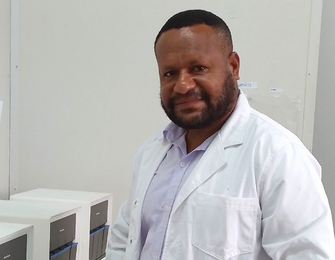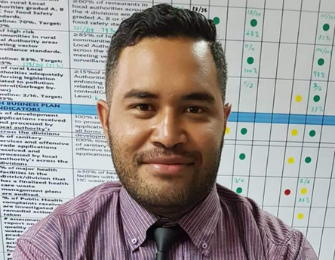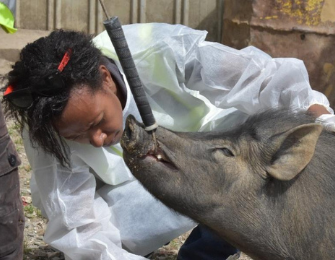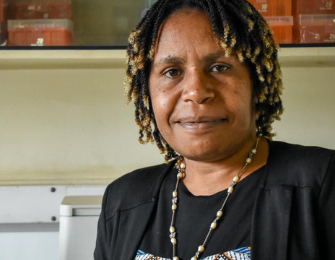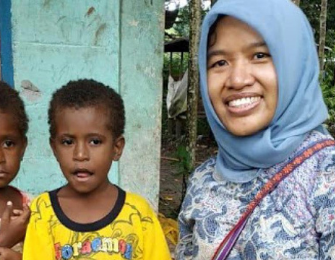
What is your current role?
I am currently a tuberculosis (TB) researcher at the Center for Tropical Medicine at the University of Gadjah Mada, Indonesia, as well as the coordinator for Innovation and Development department of the Indonesian Tuberculosis Researchers Network.
I am also a PhD candidate at Menzies School of Health Research at Charles Darwin University. I am conducting my research in Timika, located in the Papua province of Indonesia, in collaboration with the Foundation for Papuan Health and Community Development. This research contributes to the Indo-Pacific Centre for Health Security’s PRIME-TB and STRATUM projects.
What drew you to work in health security?
I first became interested in TB research when I was practicing as a general physician in a private clinic fifteen years ago. While there, I treated many patients with chronic cough and although I was able to refer patients to the nearest primary health centre for a TB test, I never knew what the outcome for the patient was. I wanted to learn more to provide better care for my patients.
In 2005, I joined a TB research project at the University of Gadjah Mada. The project studied clinical management and the referral system of presumptive TB or TB patients between public and private health facilities in Yogyakarta. We found that many gaps needed to be addressed in TB clinical management, data collection and understanding.
As a physician and researcher trained in public health, I have the skill and perspective to contribute to TB discussions to identify and implement innovative strategies to eliminate TB in Indonesia. I also believe that with continuous training for healthcare workers, good monitoring and evaluation systems, strong policy, continuous TB education for all, respect to all healthcare workers who work for TB and patient-centred care we can improve the TB situation in Indonesia.
How does your work impact people’s lives?
Since we started DFAT-funded work on TB prevention and health system strengthening work in Timika in 2017, hundreds of child TB contacts have been screened and receive TB preventive treatment, reducing their chance of getting life-threatening TB. The district is still leading in TB contact investigation, preventive treatment, as well as case finding, and was chosen to represent district programs at several national TB meetings and conferences, acknowledging the program’s achievements.
After working in a remote area of Indonesia I realised there was an urgent need to make the voices from the field be heard, especially from those who work in remote and border areas. Recently, with the Indonesian TB researchers’ network and supported by the National TB Program, we were able to conduct a national survey to more than 1000 TB stakeholders from 33 provinces and 163 districts of Indonesia. In this survey, we collected ideas about what is needed to be done to support the elimination of TB in Indonesia. This was the first time that so many ideas had been gathered together from people who work with TB in the field. Hopefully, the result of this study can change the direction of TB research in Indonesia.
It is also the individual stories that stand out to me. In 2005, I was involved in a qualitative study about TB-HIV patients. One of the patients is a writer and she wrote in one of her books that she was thankful because after the interview she felt more motivated to complete her treatment and to be a motivator for her peer group. It was really touching.
What are some of the challenges you face in your work?
We are lucky to work in a district where many of the TB staff are very motivated to support the TB program and they are known for their high performance. However, this also leads to them being asked to do additional work. For example, the involvement of most TB staff in the COVID-19 response team has reduced their working time for TB.
It is also difficult to encourage the physicians or TB workers to follow the international standard for TB care because the resources are lacking and there are issues in the distribution to health facilities. For example, short course preventive treatment is currently not available in Timika and diagnostic kits for latent TB infection remain scarce. Complex documentation, both in paper and electronic format, also affects the quality of data submitted to the national TB information system.
What is most rewarding about your work?
To be able to see TB staff from Timika speak up at local, national or international events. Train the Trainer is one of my favourite interventions - instead of inviting experts from Java to fly to Papua and give the lecture, I prefer to train local TB staff until they are confident to give the training by themselves. Sometimes I also pass on opportunities given to me to speak at national events to colleagues in Timika. After all, it is not about me, but how can I empower more TB workers or TB enthusiasts from high endemic areas, such as Timika, and draw people’s attention to ending TB in the region.
For more information about Dr Trisasi Lestari’s work in Indonesia, visit:
- PNG and the Republic of Indonesia for the Micro-Elimination of Tuberculosis - PRIME-TB Project Page
- Stronger Health Systems for multidrug-resistant tuberculosis and malaria - STRATUM Project Page
- TB project named best in province
- HOT NORTH researcher leading tuberculosis research in Papua, Indonesia

